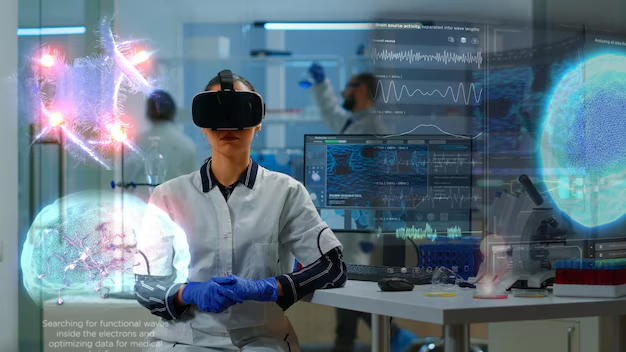Technology and science have always been closely intertwined, but in the 21st century, this relationship has become even more profound. Technology science, a term that encompasses the application of scientific principles to the development and improvement of technology, is at the forefront of driving significant breakthroughs in fields ranging from healthcare and environmental sustainability to space exploration and artificial intelligence. The fusion of technology with scientific discovery has led to innovations that are shaping our world in unprecedented ways.
In this article, we will explore how technology science is revolutionizing innovation and discovery, how it impacts various sectors, and the future potential of this dynamic relationship. From the advancements in quantum computing to the rise of AI and biotechnology, we will look at the technologies driving change and what the future holds for the next generation of innovations.
Key Takeaways
- Technology science bridges the gap between scientific discovery and technological advancement, leading to innovations that transform industries and improve lives.
- AI, quantum computing, biotechnology, and renewable energy are some of the key areas where technology science is making a significant impact.
- The future of technology science is promising, with emerging technologies like fusion energy, nanotechnology, and AI offering new solutions to global challenges.
- As technology science evolves, it is important to address ethical concerns and ensure that technological advancements benefit society as a whole.
Understanding Technology Science

At its core, technology science is the interdisciplinary field that blends scientific research with the development of technologies that improve our lives and solve global challenges. It involves using scientific discoveries to create new or enhanced tools, systems, and processes that address complex issues in fields like engineering, medicine, manufacturing, and communication.
Key aspects of technology science include:
- Scientific Research: It involves using scientific methods to explore phenomena, conduct experiments, and generate new knowledge.
- Technological Development: It applies this knowledge to build practical solutions, devices, and systems.
- Interdisciplinary Approach: It draws on fields such as physics, chemistry, biology, and engineering to create technologies that have real-world applications.
For example, the field of biotechnology merges biology and technology to develop innovations like gene editing tools (e.g., CRISPR) and personalized medicine. Similarly, advances in nanotechnology and materials science are enabling the development of lighter, stronger materials for everything from electronics to renewable energy systems.
The Role of Technology Science in Modern Innovation
Technology science has been integral to countless breakthroughs in modern science and engineering. Here are some of the key areas where technology science is having a transformative impact:
Artificial Intelligence (AI) and Machine Learning (ML)
AI and machine learning are two of the most influential technological advancements of the modern era. These technologies are revolutionizing industries such as healthcare, finance, and transportation.
- Healthcare: AI-powered tools are enabling faster and more accurate diagnoses, personalized treatment plans, and drug discovery. Machine learning algorithms can analyze medical data to predict diseases, identify patterns, and suggest treatment options.
- Automation and Robotics: AI is driving advancements in robotics, allowing for highly efficient manufacturing processes, autonomous vehicles, and robotic assistants.
Quantum Computing
Quantum computing is a highly promising field that leverages the principles of quantum mechanics to perform computations much faster and more efficiently than traditional computers. While still in its early stages, quantum computing has the potential to revolutionize industries by solving complex problems in fields such as cryptography, medicine, and artificial intelligence.
- Cryptography: Quantum computing could break current encryption methods, prompting the development of new, more secure encryption systems.
- Drug Discovery: Quantum computers have the ability to simulate molecular structures more accurately, allowing for faster drug discovery and the development of personalized medicine.
Biotechnology and Genetic Engineering
Biotechnology, the application of technology to biological systems, is one of the most profound fields where technology science is making a difference. With innovations such as CRISPR gene editing, biotechnology is revolutionizing healthcare, agriculture, and environmental science.
- Healthcare: Advances in biotechnology are enabling personalized medicine, gene therapy, and the development of new vaccines. The rapid development of COVID-19 vaccines using mRNA technology is one example of how technology science has been used to solve global health challenges.
- Agriculture: Technology science has led to the creation of genetically modified organisms (GMOs) that are resistant to pests and diseases, improving crop yields and food security.
Renewable Energy and Environmental Solutions
The impact of technology science extends beyond industry and healthcare. It is playing a crucial role in addressing some of the most pressing global challenges, such as climate change and resource depletion.
- Renewable Energy: Advances in solar, wind, and battery technologies are making renewable energy more efficient and accessible. Technologies like smart grids, energy storage solutions, and solar photovoltaics (PV) are enabling a transition to a more sustainable energy future.
- Environmental Monitoring: IoT devices and sensors are being used to monitor environmental factors such as air quality, water pollution, and deforestation. This data can inform decisions about environmental protection and resource management.
Space Exploration and Astronomy
Technology science is also transforming space exploration. Innovations such as reusable rockets, advanced satellite systems, and space telescopes are enabling humans to explore deeper into space, while advancements in AI and robotics are supporting new discoveries in space science.
- Space Travel: Space agencies like NASA and private companies such as SpaceX are using technology science to develop reusable spacecraft, reduce the cost of space missions, and explore the possibility of human colonization of other planets.
- Astronomy: The development of advanced telescopes and sensors is allowing scientists to detect distant galaxies, study the cosmic microwave background, and search for signs of extraterrestrial life.
Technology Science: Impacts Across Industries

The influence of technology science is felt across all industries. Let’s take a closer look at how it’s transforming different sectors:
Healthcare
The healthcare industry is one of the most prominent sectors where technology science has made tremendous strides. From telemedicine to robotic surgeries, technology is enabling healthcare providers to deliver better patient care while reducing costs.
- Telemedicine: Virtual consultations have become increasingly popular, providing patients with greater access to healthcare professionals, particularly in rural and underserved areas.
- Wearables: Smartwatches and other wearable devices are providing real-time monitoring of vital signs, offering insights into a person’s health and preventing diseases.
Education
Technology science has significantly transformed the education sector. From online learning platforms to AI-powered educational tools, technology has made education more accessible and personalized.
- E-learning Platforms: Platforms like Coursera, Khan Academy, and edX allow learners to access high-quality courses from anywhere in the world, making education more flexible.
- AI Tutoring: AI-driven tutoring systems offer personalized learning experiences by analyzing a student’s performance and adjusting lessons accordingly.
Finance
In the financial sector, technology science is improving processes related to transactions, investments, and security.
- Blockchain: Blockchain technology, the backbone of cryptocurrencies, is transforming the financial landscape by enabling secure, transparent transactions without intermediaries.
- AI in Finance: AI algorithms are used to detect fraud, analyze market trends, and provide investment recommendations.
Manufacturing
Technology science is also reshaping the manufacturing industry through innovations in automation, robotics, and smart manufacturing systems.
- 3D Printing: Additive manufacturing is revolutionizing product design and prototyping, allowing for rapid production of complex parts and reducing waste.
- Smart Factories: IoT devices and AI-powered machines are enabling smarter factories that can optimize production schedules, monitor equipment health, and improve safety.
The Future of Technology Science
Looking ahead, the potential for technology science to revolutionize our world is vast. Key areas for future development include:
- AI and Ethics: As AI becomes more integrated into our daily lives, ethical concerns regarding bias, privacy, and accountability will need to be addressed.
- Fusion Energy: Scientists are working to harness the power of nuclear fusion as a clean and virtually limitless energy source.
- Nanotechnology: This emerging field holds the potential to revolutionize industries by creating materials and devices at the atomic and molecular scale.
Also Read : Innovative Technology Solutions: Transforming Business And Beyond
Conclusion
Technology science is a transformative force that is reshaping how we live, work, and solve problems. The integration of scientific research with technological innovation is leading to breakthroughs that were once considered science fiction. From AI and quantum computing to biotechnology and renewable energy, the possibilities are vast, and we are only scratching the surface of what technology science can achieve.
As we continue to explore and develop these innovations, we must also consider the ethical, societal, and environmental implications of these technologies. By harnessing the power of technology science responsibly, we can create a future where innovation benefits all aspects of society.
FAQs
What is technology science?
Technology science refers to the application of scientific principles to the development of technologies that solve real-world problems and enhance human life.
How does technology science impact innovation?
Technology science drives innovation by using scientific discoveries to create new tools, systems, and processes that lead to breakthroughs in various industries, such as healthcare, energy, and space exploration.
How does AI fit into technology science?
AI is a key component of technology science, allowing for advancements in automation, predictive analytics, and machine learning. It has applications in fields such as healthcare, finance, and manufacturing.
What role does technology science play in healthcare?
In healthcare, technology science enables innovations like personalized medicine, telemedicine, and robotic surgery, improving patient care and reducing healthcare costs.
Can technology science help solve environmental problems?
Yes, technology science is driving advancements in renewable energy, pollution monitoring, and sustainable resource management, all of which contribute to solving environmental challenges.
What is quantum computing?
Quantum computing is an emerging field that uses the principles of quantum mechanics to process information in ways that traditional computers cannot, potentially solving complex problems faster and more efficiently.
What are the future trends in technology science?
Future trends include advancements in AI, quantum computing, biotechnology, renewable energy, and nanotechnology, all of which have the potential to revolutionize industries and improve our lives.

